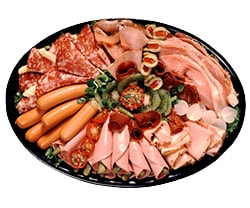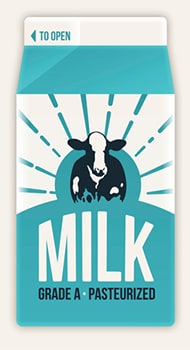Prevention

Everyone can play it safe when buying, preparing, and eating specific foods. Find out how at FoodSafety.gov, the federal gateway for food safety information.
Listeria is a harmful germ that can hide in many foods. Outbreaks of Listeria infections in the 1990s were primarily linked to deli meats and hot dogs. Now, Listeria outbreaks are often linked to dairy products and produce. Investigators have traced recent outbreaks to soft cheeses, celery, sprouts, cantaloupe, and ice cream.
Read on to learn which foods are more likely to contain Listeria and how you can take steps to protect your health, which is especially important for pregnant women, people 65 years and older, and people with compromised immunity. Most people with listeriosis are in one of these three groups.
Queso fresco and other soft cheeses

Soft cheeses made with unpasteurized milk (also called raw milk) are estimated to be 50 to 160 times more likely to cause Listeria infection than when they are made with pasteurized milk.
Although pasteurization of milk kills Listeria, products made from pasteurized milk can still become contaminated if they are produced in facilities with unsanitary conditions.
Recommendations for everyone:
- Make sure the label says, “Made with pasteurized milk.”
- Be aware that Hispanic-style cheeses made from pasteurized milk, such as queso fresco, have caused Listeria infections, most likely because they were contaminated during cheese-making.
Recommendations for people at higher risk, including pregnant women, older adults, and people with weakened immunity:
- Avoid eating soft cheese, such as queso fresco, queso blanco, panela (queso panela), brie, Camembert, blue-veined, or feta, unless it is labeled as made with pasteurized milk.
Learn more:
- Fotonovela: While Pregnant, Be Careful with Queso Fresco English [PDF – 3 pages] Español [PDF – 3 pages]
- Infographic: Check the Cheese, Avoid Listeria English [PDF – 1 page] Español [PDF – 1 page]
- Podcast: Listeriosis Outbreaks Associated with Soft Cheeses Podcast Transcript [PDF – 3 pages]
Raw sprouts

Sprouts need warm and humid conditions to sprout and grow. These conditions are also ideal for the growth of bacteria, including Listeria, Salmonella, and E. coli.
Recommendations for people at higher risk, including pregnant women, older adults, and people with weakened immunity:
- Do not eat raw or lightly cooked sprouts of any kind (including alfalfa, clover, radish, and mung bean sprouts).
- Cook sprouts thoroughly to reduce your risk for getting sick. Thorough cooking kills the harmful bacteria.
- When you’re eating out, ask that raw sprouts not be added to your food. If you buy a ready-made sandwich, salad, or Asian food, check to make sure it doesn’t contain raw sprouts.
NOTE: Rinsing sprouts will not remove bacteria. Home-grown sprouts also can make you sick if you eat them raw or lightly cooked.
Melons

Recommendations for everyone:
- Eat cut melon right away or refrigerate it.
- Keep cut melon refrigerated at 41° F or colder and for no more than 7 days.
- Throw away cut melons left at room temperature for more than 4 hours.
Hot dogs, pâtés, lunch meats, and cold cuts

Recommendations for everyone:
- Don’t let juice from hot dog and lunch meat packages get on other foods, utensils, and food preparation surfaces. Wash hands after handling hot dogs, lunch meats, and deli meats.
- Safely store products in the refrigerator:
- Hot dogs: Store opened packages no longer than 1 week in the refrigerator and unopened packages no longer than 2 weeks in the refrigerator.
- Lunch and deli meat: Store factory-sealed, unopened packages no longer than 2 weeks in the refrigerator. Store opened packages and meat sliced at a local deli no longer than 3 to 5 days in the refrigerator.
Recommendations for people at higher risk, including pregnant women, older adults, and people with weakened immunity:
- Avoid eating hot dogs, lunch meats, cold cuts, other deli meats (such as bologna), or fermented or dry sausages unless they are heated to an internal temperature of 165°F or until steaming hot just before serving.
- Do not eat refrigerated pâté or meat spreads from a deli or meat counter or from the refrigerated section of a store. Meat spreads and pâté that do not need refrigeration before opening, such as products in cans, jars, or sealed pouches, are a safer choice. Refrigerate these foods after opening.
Keep learning:
Smoked Fish

A food is called shelf-stable if it can be safely stored at room temperature or “on the shelf.”
Eating canned and shelf-stable tuna, salmon, and other fish products is not considered to increase your chance of getting sick from Listeria.
It’s important to know that not all canned foods are shelf-stable. Some canned foods are labeled “Keep Refrigerated.” Examples of such items include cold smoked fish, such as salmon, trout, whitefish, cod, tuna, and mackerel. Cold smoked fish items are often labeled as “nova-style,” “lox,” “kippered,” “smoked,” or “jerky” and typically found at seafood or deli counters of grocery stores and delicatessens.
Recommendations for people at higher risk, including pregnant women, older adults, and people with weakened immunity:
- Do not eat cold smoked fish unless it is canned or shelf-stable or it is in a cooked dish, such as a casserole.
Raw (unpasteurized) milk
 Raw milk is milk from any animal that has not been pasteurized to kill harmful bacteria. Raw milk (also called unpasteurized milk) can carry harmful bacteria, including Listeria, and other germs that can make you very sick or kill you. Although it is possible to get foodborne illness from many kinds of foods, raw milk is one of the riskiest of all.
Raw milk is milk from any animal that has not been pasteurized to kill harmful bacteria. Raw milk (also called unpasteurized milk) can carry harmful bacteria, including Listeria, and other germs that can make you very sick or kill you. Although it is possible to get foodborne illness from many kinds of foods, raw milk is one of the riskiest of all.Raw milk made into other products, such as soft cheese, ice cream, and yogurt, can also cause dangerous infections. When consuming these products, make sure they are made from pasteurized milk.
Recommendations for everyone, especially people at higher risk, including infants and young children, pregnant women, older adults, and people with weakened immunity:
- Only consume pasteurized milk and milk products, including soft cheese, ice cream, and yogurt. Look for the word “pasteurized” on the label. If in doubt, don’t buy it!
- Keep milk and milk products refrigerated at 40°F or colder.
Keep learning:
No comments:
Post a Comment